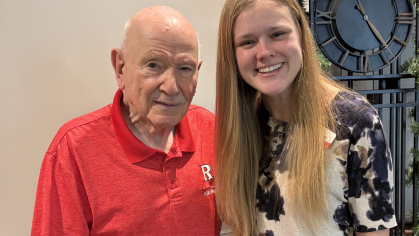The referenced media source is missing and needs to be re-embedded.
We recently had the opportunity to speak with Pat Spencer, MSW’01 about her journey to a career in social work, her current work as a therapist delivering services virtually, and her hopes for the future of the field. She also shares what the 2021 Social Work Month theme, “Social Workers are Essential,” means to her.
Tell us about your journey to a career in social work.
It started when I was a Peace Corps volunteer in Tunisia where I worked with the L’ Association des Parents at Amis des Handicapes Tunisiens to open a preschool for kids with multiple handicaps. My undergraduate degree was in elementary and special education, so when I joined the Peace Corps, I enjoyed teaching, but it wasn’t all that I wanted to do. When I returned to the U.S., I spoke with a former professor at Seton Hall, and she was contemplating getting an MSW, which is the first time I'd ever heard of that degree, and I figured if it's good enough for her, it's good enough for me.
I applied to the program at Rutgers School of Social Work, got in, and the rest has been history. Like a lot of social workers, I have been in various positions. I’ve tested the waters out. One of the beautiful things about our degree is that it is very general, so you really can work in a lot of different fields. I opened my own private practice in 2017, and I work with adults and children. A significant portion of my practice serves the LGBTQ population. I also worked as a part-time lecturer for the School of Social Work for more than a decade.
How has your work changed since the pandemic began?
Like a lot of people back in March of last year, I had to go from face to face contact to telehealth. Thankfully, I had the background of working at Vets4Warriors where I provided service via telephone, e-mail, and chat.
What was the transition to providing services virtually like? Did you face any challenges?
It was overwhelming, to be honest. My job as a therapist is to create a safe and healing environment for my clients. All of the sudden, I was thrust into the same chaos that my clients were experiencing. Whereas usually in therapy, if somebody comes to me, there's some separation between what they're experiencing and what I'm experiencing, but last March we were thrown onto this journey together.
The hardest part was figuring out how to create a safe, healing environment that's no longer face to face. I previously experienced contact with the person sitting in my office, typically anywhere from four to six feet apart. Sometimes when I worked with kids, I would sit on the floor so we could color and play, so one of the greatest challenges was figuring out how to create that environment online.
What advice would you give to someone still struggling to figure out how to provide services in a virtual setting?
Play with it and see what works for you. I would suggest watching YouTube videos of therapists to see what works well for them. Attend a webinar, get in contact with other practitioners, and ask which platforms they’re using. Another thing I would recommend for anybody, and this was a recommendation before a pandemic, is setting limits and boundaries. In the helping professions – whether you're a social worker, a psychologist, or a doctor – one of the hardest things we have to do is say, “No. I can't take on anymore.” I don’t always practice what I preach, but I aspire to set limits. I see anywhere from 30 to 34 people a week, and sometimes it gets overwhelming.
What are some of the common issues your clients have been facing since the pandemic began?
There's been a number of changes, but the biggest theme that I'm seeing clinically is isolation, especially in my teenage clients. When we think about teenage years, that's when we are blossoming socially and testing things out. They've lost all that without being in school. And I don't have an answer. It’s been a huge struggle working with these kids to help them stay feeling connected to others. One of the harder things as a therapist has been that I'm going through the same thing that they are. When they talk about isolation, I’m feeling it, too. Some days it's easier than others, and this is where self-care comes in.
What are you doing to take care of yourself?
I set hours that I will answer the phone or text messages quickly, unless there’s an emergency. I don't respond to work e-mails outside of certain times, and I try to have regular work hours each day. I also prioritize working out, staying connected with friends, and attending trainings.
You also conduct trainings, correct?
Yes, and the trainings I’ve conducted over the past year have all been about telehealth. I actually created the telehealth certificate course for NASW New Jersey and have done some trainings through the School of Social Work’s Office of Continuing Education. I’ve done webinars for NASW as well, and they’ve been published nationwide.
The 2021 Social Work Month theme is “Social Workers are Essential.” What does this theme mean to you?
Social workers are essential. As are teachers, nurses, doctors, grocery store workers, the workers who keep hospitals, clinics, and schools clean and running, the staff that support those workers, the people who maintain our water processing plants and electric companies. In short, anybody that supports the wellbeing, care, and comfort of others is essential. As a social worker, that is exactly what we do. We serve our communities and the people in them whether in hospitals, schools, community centers, homeless shelters, private practices, or government offices. We advocate for change, we push against the systems we and our clients are living in, we see those who may not feel seen, and we amplify the voices of those who have often not been heard.
What do you think are some of the most pressing issues in the field that need to be addressed?
We have to start with racism and look at what role social work has played in perpetuating some of the racist policies that we have. I’m also interested in addressing how the environment has impacted people’s lives. During the pandemic, I’ve been concerned about people’s access to the internet and childcare. But there’s also the issue of LGBTQ rights – especially the rights of transgender individuals – and so many more things that need to be addressed. The list is long, and we need more social workers involved in politics.
How do you feel about the future of social work?
I feel hopeful about the future of the field. However, I would love for us as a profession to find a way to get in front of society’s problems so we can be a voice for the solution before they become bigger issues. I wish there were ways to get social workers’ voices heard more often. We need to advocate for ourselves, but a lot of us are getting incredibly burned out.
Something I would encourage social workers to do is to get involved with NASW because they do a lot of policy work. I was a delegate for the most recent assembly for NASW, and just last month I was able to vote on the top five areas that I’d like to see as a focus of the profession. I would love to have more and more social workers’ voices – especially a diverse array of social workers – heard.



